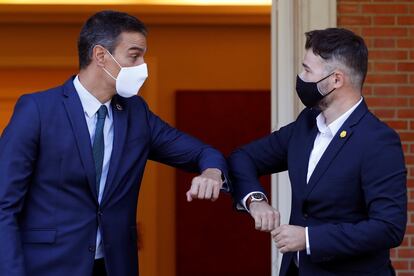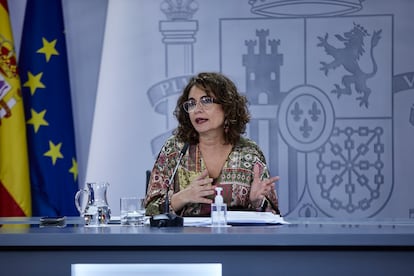Spanish government secures pledge for budget deal with Catalan, Basque support
The center-left executive expects greater political stability in exchange for concessions on regional taxes and spending control

The Spanish executive has secured enough support to get its 2021 budget plan approved in Congress, bringing added stability to the minority center-left government of the Socialist Party (PSOE) and Unidas Podemos.
Spain has been functioning since 2018 with a budget that was approved by the previous Popular Party (PP) administration. The country held a snap election in April of last year after parliament voted down an earlier draft, and this was followed by another election in November. Prime Minister Pedro Sánchez of the PSOE is hoping that this new budget deal will see him through the remainder of the political term.

Support is being provided by three regional parties that also backed Sánchez’s return to the prime minister’s office in January of this year. The executive said it has reached a “preliminary deal” with the Catalan Republican Left (ERC), and ensured backing from the Basque Nationalist Party (PNV) and Bildu, a far-left Basque party. Together with the governing coalition partners, they represent 179 seats, three more than required for an absolute majority.
But Ciudadanos (Citizens), a national center-right party that had initially offered support, said that it cannot join a pact with ERC, which played a key role in the Catalan government’s 2017 attempt to unilaterally secede from Spain, or with Bildu, whose leader Arnaldo Otegi was once a spokesperson for the political wing of the now-defunct terrorist group ETA.
Sources at ERC who were present at the negotiations said that they accelerated their own talks with the government and with the two Basque parties in a bid to “keep Ciudadanos out of the equation.”
Powers restored
The parliamentary spokesperson for ERC, Gabriel Rufián, said on Tuesday that his party has reached a preliminary agreement with the executive, although the deal still needs to be ratified by the senior leadership of the Catalan party on Wednesday.
Under the draft plan, the Catalan government will have “all its powers restored to manage its expenses,” according to ERC. The Catalan government feels that its financial independence was curtailed in 2015 when the central executive, then under Rajoy of the PP, introduced spending controls to prevent regional officials from using the funds towards independence goals.
These controls were introduced before the application of Article 155 of the Spanish Constitution following the illegal referendum of October 2017. Some of those restrictions were lifted by the PSOE government two years ago.
Madrid, a “tax haven”
The ERC also underscored that it has convinced the central government to support the creation of a working group to study “a comprehensive, fair and progressive tax reform” that will “end the tax haven created in the Madrid region by the political right.”
The Catalan party wants the wealth tax to be more progressive and more uniform among the various regions, which have broad powers to apply deductions on certain taxes. Other regions governed by the PSOE, such as Valencia, have voiced similar complaints in the past about Madrid, which has very low inheritance-, gift- and wealth-tax rates.
Finance Minister María Jesús Montero is working on a reform to reduce these regional disparities, but said that the plans were already on the table before the budget deal with ERC and the Basque parties.
Madrid regional premier Isabel Díaz Ayuso, of the PP, on Thursday warned that she will not stand by and let this happen. “I’m going to be the worst nightmare of whoever touches the taxpayer’s pocket,” she said in an interview on the private television network Antena 3. “What the PSOE and Pedro Sánchez are doing is to give wings to the independence movement.”
The PNV’s congressional spokesperson, Aitor Esteban, also expressed satisfaction about the budget deal, and noted that half of its 85 proposed amendments have been adopted. Under the terms of the agreement, the Spanish Defense Ministry will hand over military land located in Loyola, near San Sebastián, so that the city can expand. In exchange, local authorities will give Defense another plot of land to build new barracks.
The current budget was passed in June 2018, just a few days before a no-confidence vote led by Pedro Sánchez ousted former prime minister Mariano Rajoy from office. Since then, a highly fragmented parliament has failed to agree on a new spending plan.
Nearly two years ago, a draft budget put forward by the PSOE and Podemos was rejected by right-of-center parties and by Catalan nationalists, leading to early elections in April that were won by the PSOE. But Sánchez’s inability to form a government led to another general election in November, which the PSOE won again but by a smaller margin, leading to the formation of Spain’s first coalition government in recent democratic history.
With reporting by Manuel Viejo.
English version by Susana Urra.
Tu suscripción se está usando en otro dispositivo
¿Quieres añadir otro usuario a tu suscripción?
Si continúas leyendo en este dispositivo, no se podrá leer en el otro.
FlechaTu suscripción se está usando en otro dispositivo y solo puedes acceder a EL PAÍS desde un dispositivo a la vez.
Si quieres compartir tu cuenta, cambia tu suscripción a la modalidad Premium, así podrás añadir otro usuario. Cada uno accederá con su propia cuenta de email, lo que os permitirá personalizar vuestra experiencia en EL PAÍS.
¿Tienes una suscripción de empresa? Accede aquí para contratar más cuentas.
En el caso de no saber quién está usando tu cuenta, te recomendamos cambiar tu contraseña aquí.
Si decides continuar compartiendo tu cuenta, este mensaje se mostrará en tu dispositivo y en el de la otra persona que está usando tu cuenta de forma indefinida, afectando a tu experiencia de lectura. Puedes consultar aquí los términos y condiciones de la suscripción digital.








































